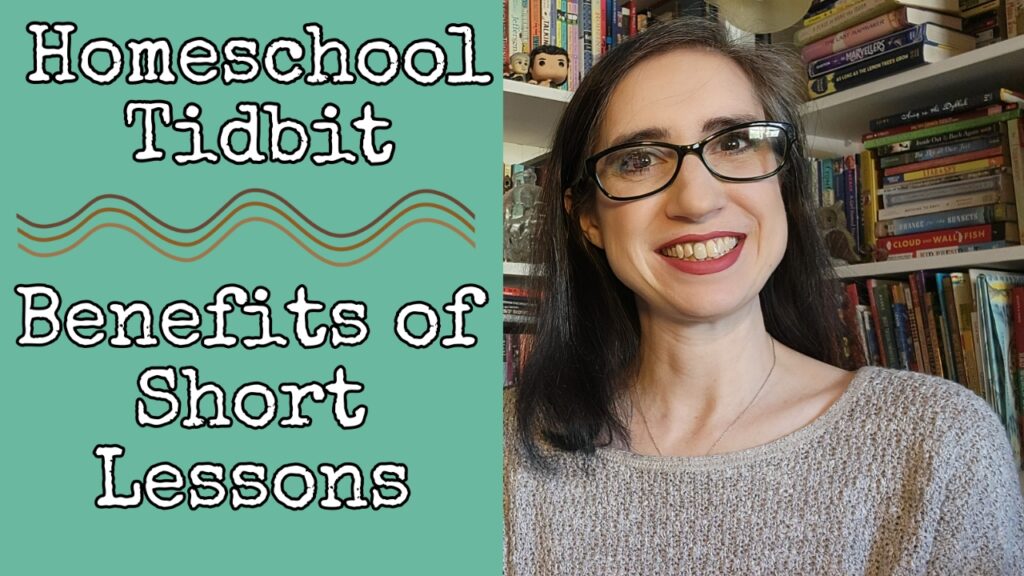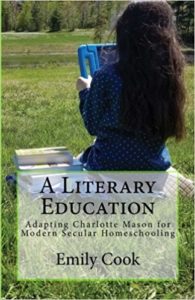Homeschool Tidbits: Benefits of Short Lessons
March 31, 2023

Welcome to Build Your Library’s Homeschool Tidbits: Episode 47 – Benefits of Short Lessons. In this weekly video series, I will delve briefly into a topic related to homeschooling and will share some of my knowledge and expertise as a long-time homeschooling mother of 4 children. Three of whom have graduated high school and one who is a college graduate!
I have mentioned the idea of short lessons many times recently, so I wanted to dive a bit deeper into what that actually entails. You might hear “short lessons” and think that it sounds like you are rushing through the school day. But that isn’t what is happening at all. Yes, the lessons are short, but that doesn’t mean they are rushed.
First, I want to remind you that a public school day is a long 6-7 hours a day. This is sadly NOT because they are covering tons of great educational material, but a lot of time is spent on the classroom management of 12-30 students. You will never need as much time to homeschool your own children. Let go of any guilt you might feel for finishing your homeschool day with a young child in only 2 hours.
Charlotte Mason wanted to ensure that her students could give their full attention to a lesson. To do that, the lessons would need to be short and to the point. How much full attention they can give will depend greatly on their age. A six-year-old won’t have nearly the same attention span as a 16-year-old. The younger the child, the shorter the lessons would need to be. She considered this a form of habit training. Helping children to maintain their focus on what they are learning, rather than giving them the opportunity to let their minds wander.
There are some excellent reasons to consider giving shorter lessons a try:
Increased focus and attention
Short lessons allow students to focus on one task at a time and avoid getting either overwhelmed or bored. This can lead to better comprehension and retention of information. By spending just 10 – 15 minutes on a phonics lesson, you are giving them just enough time to give their full attention. Since the lesson is short, they don’t have time to get antsy or overwhelmed.
Increased motivation and engagement
When lessons are kept to an age-appropriate length of time, they can be more engaging for students. While they will be less likely to feel bored or restless, they will also be more focused on the task. Remember what it was like to sit in a classroom and listen to a teacher drone on about a subject you didn’t care about? How difficult was it to give it your full attention? By shortening the length of lessons you are helping to engage your child in a subject they might struggle with, ensuring that they are really learning.
Increased flexibility
When it comes to homeschooling, flexibility is the name of the game. Short lessons can be adapted to the needs of individual students. This can be helpful for students who need extra time to understand a concept or who are easily distracted. Where one child might need just 15 minutes to understand a phonics lesson, another might need 30. Every child is different and we get to tailor their education to them, not the other way around!
Increased opportunities for breaks
Short lessons allow for more opportunities for breaks, which can help students to stay focused and avoid fatigue. Maybe after a 20-minute math lesson, your child is still struggling. Don’t feel like you need to spend another consecutive 20 minutes on it. Maybe what they need is a break. Because lessons are short, you can do that! Go for a walk, move on to a subject they find less challenging, read a book together, whatever you need to do to let them recharge before jumping back into that math lesson.
Increased opportunities for review
Keeping lessons short allow for more opportunities for review, which can help students to consolidate their understanding of the material. This is great because you can build review right into your schedule. Because lessons are shorter, you can easily start with a review of previous material before moving on to new lessons without it dragging out your school day.
You might be wondering, how short is too short?
As I stated earlier, lesson length will depend on age. For the under-8 crowd, you want to aim to spend 15 – 20 minutes on lessons. Late elementary age, around 9 – 11, should spend about 20 – 30 minutes, and for middle and high school-aged students, you are spending 30 – 45 minutes per lesson.
Some subjects may take longer, and some you can work through more quickly. This will vary between children, but the key is to ensure that you are aiming at an amount of time that will hold your child’s focus.
A caveat – Some children can focus for much longer amounts of time when they are very interested. You might be tempted to stop them after the allotted lesson time has passed. But as long as they are focused and doing their best effort, let them continue! Like anything else, we have to consider the individual child.
Overall, short lessons can be a great way to improve student learning and engagement.
Coming up next…
I hope you found this Tidbit helpful! Come back next week for more homeschooling inspiration!
Until then, happy reading!
See Other Related Articles:
- Happy, Hygge Homeschooling?
- “Are worms made out of metal?” And other great rabbit trails.
- Charlotte Mason in the Secular Homeschool
- A Literary Education book
- About Build Your Library
- Homeschool Tidbits: Build Your Library’s Weekly Video Blog Series
.
 Emily Cook is the author and creator of the secular homeschool curriculum Build Your Library, a literature-based K-12 program infused with the teachings of Charlotte Mason. She writes full-year lesson plans as well as shorter topical unit studies. Emily has been homeschooling her four children in Southern NH for 21 years. She is passionate about reading aloud to children of all ages and loves to share her love of literature with others. She and her family also make incredibly dorky videos about homeschooling, books, and more on Youtube at ARRRGH! Schooling. You can follow her on Facebook, Twitter, and Pinterest. You can also check out her author page on Amazon.
Emily Cook is the author and creator of the secular homeschool curriculum Build Your Library, a literature-based K-12 program infused with the teachings of Charlotte Mason. She writes full-year lesson plans as well as shorter topical unit studies. Emily has been homeschooling her four children in Southern NH for 21 years. She is passionate about reading aloud to children of all ages and loves to share her love of literature with others. She and her family also make incredibly dorky videos about homeschooling, books, and more on Youtube at ARRRGH! Schooling. You can follow her on Facebook, Twitter, and Pinterest. You can also check out her author page on Amazon.
